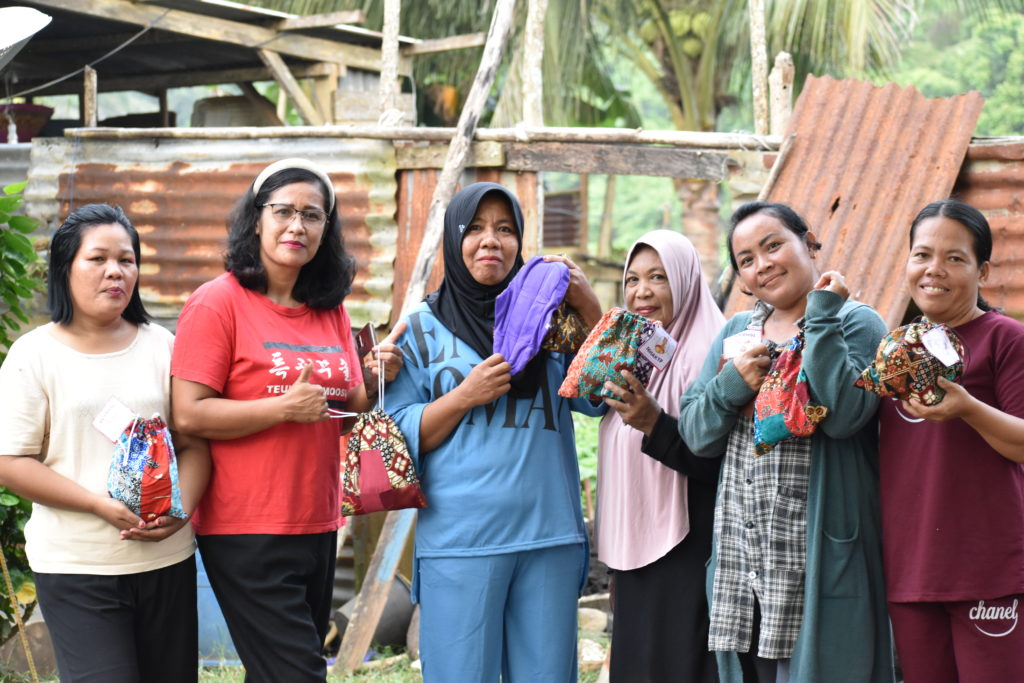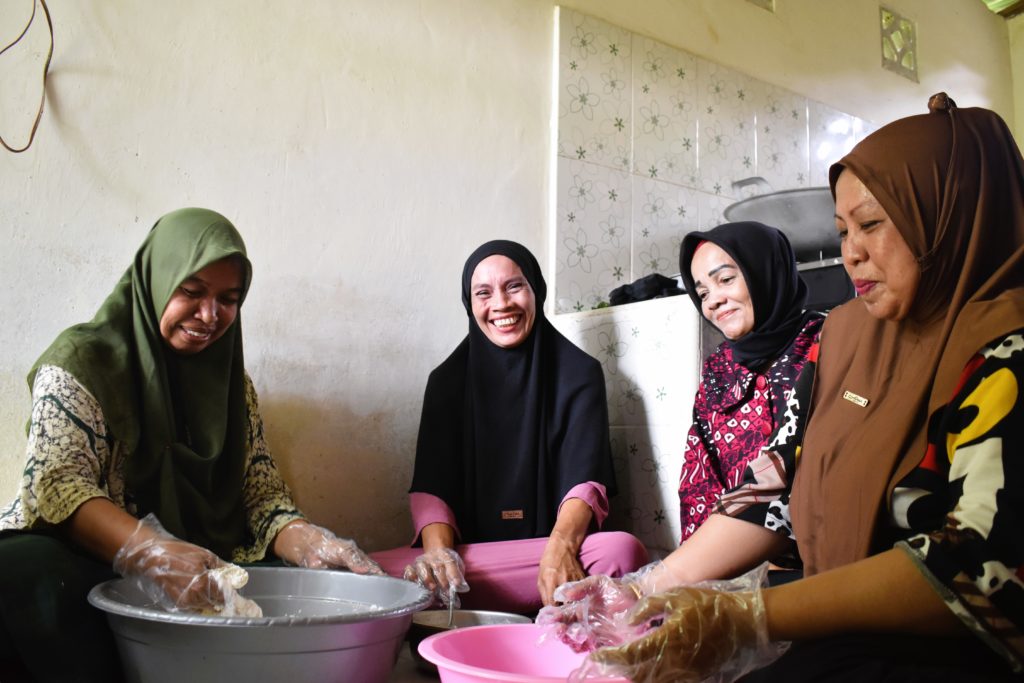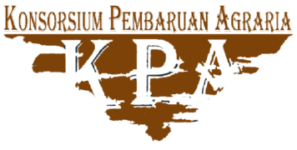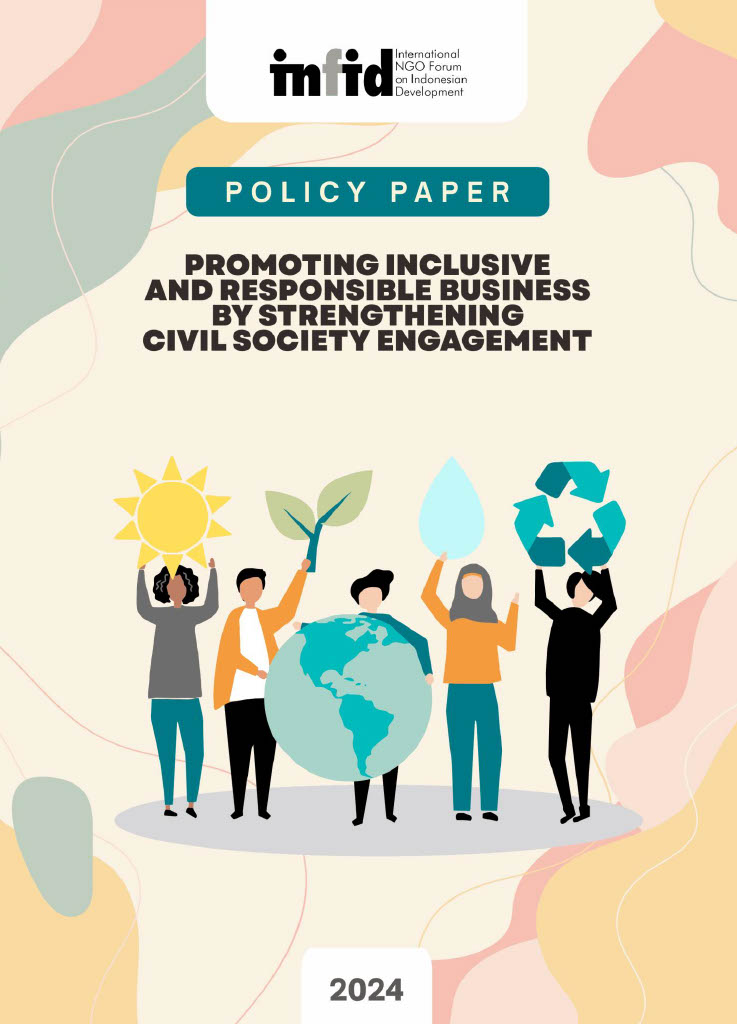📍 Indonesia/Oxfam Great Britain

Fair for All Project in Oxfam in Indonesia
The Fair for All (F4A) initiative in Indonesia targets the establishment of Just and Sustainable Business Models within agricultural value chains, focusing particularly on the palm oil and seafood sectors.
The Fair for All project in Indonesia is being implemented since April 2021. Over the span of two years, we have actively engaged 3,785 individuals, of which 59% are women. These individuals represent various groups including women’s and youth groups, farmer groups, civil society organizations (CSOs), and government entities. For the women empowerment initiatives of the F4A project in Indonesia, we engage 21 women economic groups, 1,784 women, 685 men during past 2 year.
Erna (second from the left) and her fellow Berlian Women Farmers Group from Takalar, South Sulawesi, were producing the homemade Seaweed Stick as part of the group’s main activities.
(Photo: Nabilla/Oxfam)

This endeavor operates at both national and local levels, concentrating on five specific districts and cities: Kabupaten North Konawe, Southeast Sulawesi; Kabupaten Morowali, Central Sulawesi; Kabupaten Takalar, South Sulawesi.
The Women Farmers’ Group in North Konawe received support in the form of tomato, eggplant, and chili seedlings from the Village Government.
(Photo: ASSPUK)

The project is conducted in partnership with three prominent collaborators:
- ASPPUK (Asosiasi Pendamping Perempuan Usaha Kecil Mikro or Association for Women in Small Business Assistance)
- Transparency International Indonesia (TII)
- Consortium for Agrarian Reform (KPA)



The WEE related activities are implemented by ASPPUK, focusing on empowering women in small and micro businesses through capacity-building, envisioning strong and gender-just women in this sector. The organization works to build a network advocating for gender equality, inclusive value chain, as well as improving women’s role in the decision-making process in their respective area.
Specifically, ASPPUK works in Pathway 1 of Fair for All project that mainly focuses on empowering women small-micro-scale enterprises in rural area around the plantation and coastal area and strengthening CSOs to promote women’s rights, women-led alternative economic model, and inclusive financial and market access.
Rima, head of Berlian Women Farmers Group in Takalar, South Sulawesi, presenting her group’s activities in front of local head of village and representatives of Oxfam in Cambodia who visited Takalar for an Exchange Learning Visit of F4A project.
(Photo: Nabilla/Oxfam)

In Indonesia, women encounter significant challenges impacting their autonomy and economic empowerment within the seafood and palm oil sectors. A primary concern is the constrained access to resources and avenues for decision-making. Within these industries, women frequently confront barriers to obtaining land, credit, technology, and market access, impeding their capacity to engage fully and prosper financially.
Moreover, entrenched gender roles and societal expectations frequently hamper their involvement in economic pursuits and decision-making roles. The role of women was very limited in the seafood and palm oil value chain. For example, the social and cultural norms in Sulawesi particularly in South Sulawesi called masiri influence gender relations in seafood farming communities and affects opportunities and decision-making for women. This creates unequal relations both in the household level (domestic) and in the farming process (public).
ASPPUK, Oxfam, INFID, KRKP, and Prakarsa submitted CSOs Communique for Inclusive Business Summit 2023 to the Indonesian Ministry of SMEs.
(Photo: Nabilla/Oxfam)

- Organization of women and youth groups to establish/develop alternative businesses (economy)
- Conducting research and assessment on the progress of Women Economic Empowerment in communities around the plantation and coastal areas.
- Training: gender-responsive entrepreneurship, community business, and product innovation (social and economy)
- Intensive mentoring for alternative business groups (social and economy)
- Capacity building for women and youth groups on gender issues, economic resources and opportunities, organization and technical facilitation skills (leadership skill), public speaking, and negotiation (social economy)
- Focus group discussions, lobbying, and dialogue with multi-stakeholders to synergize and collaborate in empowering women and youth economically (social and political)
Current challenges in implementing your WEE-related project/intervention
- Difficulty in accessing cooperation opportunities with companies in women’s economic empowerment.
- Low production capacity of alternative business products due to limited production equipment.
- Social norms that are still gender discriminatory hinder the application of gender values in the domestic public domain (domestic; unpaid care work, public; women land rights).
- Political dynamics and turnover of officials in government organizational structures at project sites impact the discontinuation of commitments and information that have already been established.
Members of local women farmers group who participates in Fair for All programs in Landawe Utama are harvesting crops in the middle of dry season.
(Photo: Asdar/Oxfam)

The livelihood approach within communities remains crucial as it addresses the primary issue of meaningful participation in the value chain, wherein inclusivity fulfills the basic economic needs of communities and women’s groups. Therefore, in line with our influencing capacity, the project also supports the business development of these women’s groups. Unfortunately, the project implementation itself cannot provide financial support or tools for this business development.
Therefore, F4A Indonesia’s intervention prioritizes livelihood activities as a gateway to economic empowerment, which not only enhances the value of seafood products but also generates income for women, thereby increasing their decision-making power within households. This leads to changes in awareness, confidence, knowledge, and the ability to voice aspirations in public decision-making forums.
Furthermore, F4A Indonesia provides training on gender and women’s leadership to address social norms that hinder women’s participation in households. The involvement of both men and women creates space for discussion and sharing of their respective workloads, including caregiving and household chores, aligning with a shared household vision. This approach shifts the mindset of men to share care work in the household and reduces barriers for women to engage in public space or economic activities such as agriculture, fisheries, and aquaculture.
Products such as fish sticks, seaweed jam, fish crisps, and seaweed sticks are processed by alternative business groups in Takalar Regency.
(Photo: ASSPUK)

Opportunities currently being implemented to address challenges to promote women’s economic empowerment in the project
The allocation of village fund from the Annual State Budget (APBN) is a huge opportunity not merely for rural communities as a whole but also for women and youth group (each village in Indonesia receives “village fund” on average 1 billion IDR/59,000 EUR per year). Currently, women group facilitated by ASPPUK have advocated the budget allocation for women economic empowerment. Recently, one of group in Ujung Baji Village has accessed village fund for women and youth training for developing small business.
In addition, ASPPUK also take the momentum to advocate the development of community learning center in each village sites and later incorporate women empowerment agenda within the learning center. Recently, this effort is still on the process on lobbying the village government along with the Education Department to accelerate the development of community learning center.
Opportunities in the future to promote women empowerment and visibility of women in your projects/F4A Programme
There are some opportunities to promote WEE in the context of the project based on the current context in Indonesia. After the issuance of National Strategy of Business and Human Rights (BHR), women economic empowerment is one of specific areas that become a focus in Strategy 1 on Increasing Understanding, Capacity and Promotion of Business and Human Rights for All Stakeholders which consists of sub action on Conduction Gender Transformative Entrepreneurship Training. This is an opportunity to linkage with government agenda on driving more inclusive and responsible value chain.
In addition, following the side event of 6th ASEAN Inclusive Business Summit 2023 hosted by the Government Indonesia, during which CSOs coalition consists of Oxfam and partners have been received a good response from the Ministry of SMES in Indonesia, there is also opportunity to participate in IB Knowledge Hub as the follow up of IB Summit in Bali. Thus, the CSOs and WROs could have meaningful participation in collaboration with other stakeholders in scaling up women economic empowerment.
What are you most proud of in your WEE-related project/ intervention (best practices)?
During its two-year duration, the FAIR for All project has played a significant role in fostering the development of alternative business practices resilient to climate change in North Konawe, Southeast Sulawesi. Oxfam partners have worked to bolster the capacity of communities residing near palm oil plantations, thereby reinforcing the concept of fairness in sustainable livelihoods. Through diversifying commodities, communities are not solely dependent on palm oil but are also involved in cultivating other non-palm crops. In addition, the alternative business groups have successfully manufactured and distributed products within the village, contributing to the local economy.
Furthermore, the implementation of the FAIR for All Project over two years has played a role in enhancing the capacity of women farmers’ groups in women’s economic empowerment in North Konawe, North Morowali, and Takalar. This capacity strengthening entails activities such as group management, mapping village potentials for alternative business development, and improving critical skills by understanding and addressing the existing challenges encountered in rural settings. Now, there are legal recognition of these groups facilitates their expansion, granting women and youth access to village funds and economic empowerment initiatives, thereby addressing political dimensions of empowerment.
Additionally, a Memorandum of Understanding between the Department of Agriculture and Food of North Morowali District and ASPPUK underscores governmental commitment to strengthening technical capacities for agricultural cultivation in critical lands, highlighting political efforts toward sustainable development. Moreover, women and youth groups benefit from government and Civil Society Organizations.
Looking ahead, we envision the WEE initiatives do not only extend to economic livelihood activities, but also include activities to increase their capacities, in terms of leadership, influencing, advocacy, campaign, etc, especially to influence decision-making process that affected women.
By fostering partnerships and collaborations with governmental agencies, civil society organizations, and other stakeholders, we can create an enabling environment that supports women’s economic participation and leadership.
The end goal is that our WEE initiatives should be able to empower women so they can transform their life to the better situation according to their own terms.
Molores village women’s leadership training.
(Photo: ASSPUK)

Kami (Juga) Punya Peran – International Women’s Day
Watch the untold stories of women shaping the seafood industry, focusing on the diverse roles, challenges, and triumphs of women along the seafood value chain.
Full name: Muh Fardan Ngoyo
Position: F4A Project Manager
Organization: Oxfam in Indonesia
Email address: mngoyo@oxfam.org.uk


